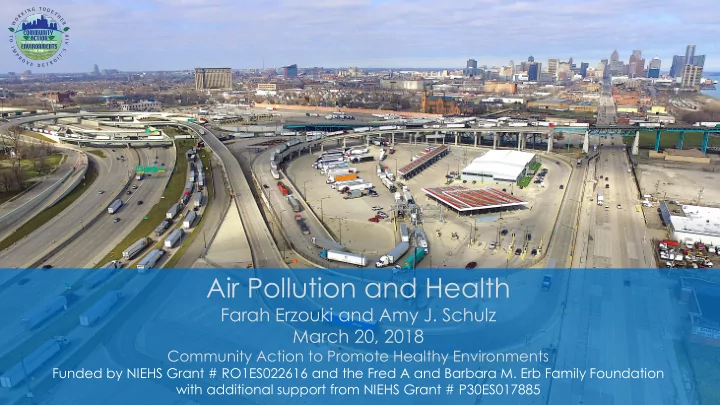

Air Pollution and Health Farah Erzouki and Amy J. Schulz March 20, 2018 Community Action to Promote Healthy Environments Funded by NIEHS Grant # RO1ES022616 and the Fred A and Barbara M. Erb Family Foundation with additional support from NIEHS Grant # P30ES017885
Criteria pollutants emitted MDEQ DTE Dearborn CEP, LLC Permit to Install No. 144-17, Proposed Project Summary
Health effects of pollutants Respiratory, Cardio- Central Prenatal Death asthma, vascular Nervous Development/ COPD Risk System Birth Outcomes PM2.5 X X X SO2 X CO x x x X X NOx X Ozone X x X = adequate evidence of health effect; x= suggestive evidence of health effect
People who are particularly susceptible to adverse health effects People with Cardio- Developing Young Older asthma, vascular infants children people COPD Disease PM2.5 X X X X SO2 X X CO x X x x x NOx X X X Ozone X X X X = adequate evidence of health effect; x= suggestive evidence of health effect
Quantified Health Impacts • Each year in the Detroit Metropolitan Area, air pollution is responsible for: • 690 deaths • 1800 hospitalizations and emergency room visits • Thousands of missed school and work days • Total monetized cost of $6.9 billion per year These effects occur disproportionately in areas with higher exposures and more vulnerable residents Community Action to Promote Healthy Environments (CAPHE), Public Health Action Plan February 1 st , 2017
Natural Gas – Clean Fuel? Focus on Clean Fuels Natural gas is sometimes called a “clean” fuel because it emits 50% less carbon dioxide than coal when burned. Drilling for natural gas and transporting it in pipelines results in leakage of methane, an important greenhouse gas that contributes to global climate change Clean energy sources such as wind or solar https://www.ucsusa.org/clean-energy/coal-and-other-fossil-fuels/environmental-impacts-of-natural-gas#.Wq24WugbM2w
CAPHE Partners Project Manager: Kristina Rice, klrice@umich.edu, (734) 764-2955
Recommend
More recommend